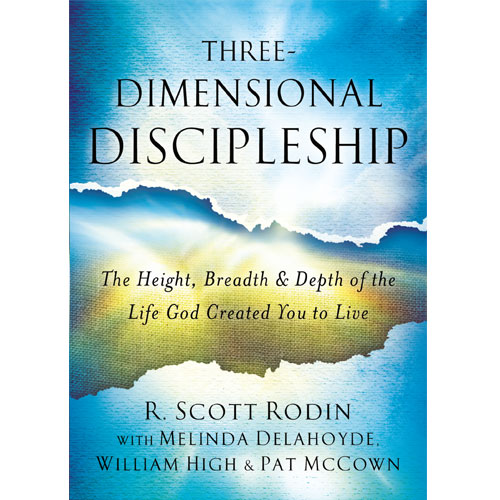Stewardship in Transition
By Kelsey McFaul
Mark Parcher talks about compartmentalization and the worst case scenario in the steward’s journey

From mechanical engineer in Silicon Valley to bilingual teacher in Costa Rica, to ministry director in Belize, to fruit grower in rural Washington state.
For many people, these would be difficult transitions, filled with uncertainty, logistics, concerns about livelihood, and questions of identity. And while that’s true for Mark Parcher, he also finds transitions to be some of the best moments of his stewardship journey.
“During transition times, I think we’re very consciously aware of our need for God. We’re anticipating that this is going to be hard and the only way to get through it without a whole lot of stress is by praying, asking God to prepare the way and walk alongside us.”
Transitions remind us that, despite appearances to the contrary, we do not control our circumstances and it’s impossible to compartmentalize the different parts of our lives.
“When things are going well, you get this false sense that you have everything under control. It’s easy to get ahead of God or behind Him, not relying on Him, not abiding in Him. I think God wires the world so that when we drift away from Him certain things don’t go well, and we are naturally drawn back to Him.”
Mark’s stewardship journey began as a mechanical engineer for IBM and then for several start-up firms in Silicon Valley, California, where it was relatively easy to compartmentalize his work and spiritual lives.
“Compartmentalizing God allows me to leave Him out of certain areas of my life. It’s me wanting to be in control, not letting God be God. That’s the worst case scenario. A lot of people would say that the worst case scenario is losing your health, your money, your job, your wife, you fill in the blank. But really the worst case scenario for me would be to lose my faith in God, where I take control and don’t allow God to be who He is in my life.
“In the Silicon Valley, it’s really easy to push God out of the workplace because God doesn’t help you in the workplace. That’s the mentality. So I think [during that time] I pushed God out [of that part of my life] and didn’t invite Him to be in control or even identify publicly with Him.”
Because of his success, Mark perceived that he exercised control in his workplace setting. While God was a part of his life, He was just that–a part. Mark owned his effort and his success, while God was merely a manager.
“I prayed, but the prayer was more like, ‘God, this is what I need to do; You need to help me do it. It’s me doing it, and I’d like Your help.’ At least I had God in the equation, but I didn’t really think of Him being in control. I thought of Him as being a helper. Now I flip that around: God is in control and I’m the helper.”
Things began to change in 2001 when Mark and his wife Adrienne, also a mechanical engineer, took the chance to defer their incomes for five years and save for a long vacation in Europe.
“During that five-year period of time, I started feeling like God was saying, ‘It’s a great idea to quit your job and do something different, but what do you think about doing something for Me?’ But I didn’t tell Adrienne because she was so excited about this plan we had.
“One day she came to me and said, ‘You know, I’m starting to feel like we should do some mission work or something.’ My jaw dropped. I thought, oh my gosh. He’s telling her the same thing He’s telling me.”
After thorough searching, spreadsheeting, and praying, Mark and Adrienne joined Latin American Mission as bilingual teachers in San Jose, Costa Rica, in 2006.
“It felt like God was challenging me by saying, ‘Ok, you’re faithful to Me and you love Me and believe in Me. But what if I take away this income? Then who are you? If you don’t have this title, who are you? Who are you if you don’t live where you live now? Who are you if everybody now knows you’re a Christian because you’re going off to Costa Rica and you can no longer hide it?”
Mark’s first major transition required him to surrender his income, title, job, and home. In the process he realized how little control he’d had over them all along. The compartments he’d constructed for different parts of his life began to dissolve and merge, and it was impossible to keep his work and spiritual lives separate.
“The way I try to respond is, ‘Well, it doesn’t matter. It doesn’t matter how much I make. It doesn’t matter what my title is. It doesn’t matter where I live. You are my God and my Father and I am Your child.”
Letting go of his compartmentalized life and pursuit of income, security, and titles freed Mark to live as a leader of no reputation. People of no reputation, writes Henri Nouwen, are those, like Jesus, who live in the world with nothing to offer but their own vulnerable selves, stripped of titles, prestige, and power.
“One of the cool things about being in another country is people want to know why you’re there. People are interested: who are you? Why aren’t you living in the U.S.? Why would you come to a place like this? And it’s so easy to say I’m here because Jesus did so much for me and I want to do this for him.”
By surrendering and opening up his compartments, Mark was able to share his faith with freedom and joy. Letting go of his pursuit of titles and income freed him to new opportunities for stewardship and even more transition.
“When you get to the point that you’re willing to quit a very lucrative job and give up a nice title and go do something for God, you’ve suddenly made a key decision in your life. [For Adrienne and me,] we weren’t ready to just go back and get our old jobs back and just have that be a nice story. Now we’re in the mood of everything we do, we want to do it for God.”
Following their year in Costa Rica, Mark and Adrienne worked with some friends to begin a new ministry in Belize called PathLight International, which partners with local schools, churches, and communities to transform young people into steadfast followers of Christ who receive a quality education and pursue pathways leading to meaningful vocations.
It was while living in Belize that Mark saw the significance of stewardship in seemingly simple circumstances.
“We worked in villages that were very poor, very impoverished, where most people didn’t have a job. The fathers of these households have their family, their community and friends, and a little plot of land. It was maybe five acres and they worked it and got a lot of satisfaction out of that.”
The Belizeans Mark worked with were stewarding their relationships in all four areas of steward theology: their relationships with self, God, others, and creation.
“They had all the things God promises us. You know, He doesn’t promise us fancy houses, but He does say you’ll be sheltered, have clothing, and He provided them with seeds and land. It just really intrigued me, and and I always thought it’d be so cool to just be able to have a farm.”
After 10 years of ministry work in Costa Rica and Belize, Mark and Adrienne made another transition, this time to a fruit farm in Greenbluff, Washington, where they grow blueberries and cultivate an orchard open for public picking in the summer months.
“We moved up here and took over this orchard and blueberry farm without having any experience. We had some tomato plants in our backyard once; that’s about it. So we’re on a pretty steep learning curve and sometimes I just want somebody to tell me what to do.”
But the uncertainty, insecurity, and questions about sufficiency and identity are also Mark’s sweet spot, and they remind him again and again of his role as a steward who’s been trusted with God’s resources.
“We named it Abundance Farm because God has provided so abundantly for us. And He hasn’t done that because of anything we’ve done; it’s just that that’s who He is. We want to share that with others because we’re the stewards of it.”
Now, Mark’s flipped his initial understanding of owners and managers and eliminated the barriers between different parts of his life. He sees his life, farm, livelihood, and business in God’s ownership, while he is the steward and manager.
“For me, it’s just all about blessing people that want to come up here with fresh fruit and a fun experience. They have a great time and we get to see kids with their faces all covered with red or blue because they’re munching all the fruit while they’re out there picking. I really feel like this is God’s place and He can do whatever He wants with it.”
In Belize, Mark observed the integral relationship between the four spheres of stewardship in the lives of the farmers he worked with. Now, he’s experiencing it firsthand.
“The concept of stewardship provides you a logical way of looking at success. Success to me is not compartmentalizing God, but letting God be God in every single facet of life. Steward theology provides me a systematic way to examine myself. I can look at my relationship with my wife, with other people, or with the things I own, and I ask myself, ‘Am I trying to control this? Or am I working on God’s behalf and being completely willing to let Him be the owner?’”





